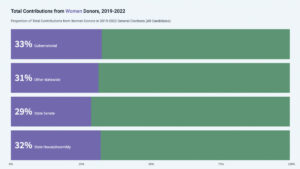Women, who make up a third of all state lawmakers nationwide, are also underrepresented as donors to state-level political campaigns, a gap that has wide-ranging implications for female power and influence, according to a report released Tuesday by the Center for American Women and Politics at Rutgers University.
Women gave less than a third of all money contributed to gubernatorial, statewide, executive and legislative races from 2019 to 2022.
While there were wide variances between states, women’s contributions were outstripped by men’s in every state in the 2022 elections. The discrepancy was also evident in key abortion battlegrounds after the Dobbs v. Jackson Women’s Health Organization Supreme Court decision that ended the constitutional right to an abortion, an issue that galvanized female voters.
“What the data are showing is that women’s voices aren’t heard to the same extent as men’s,” said Kira Sanbonmatsu, the lead author of the report and a CAWP senior scholar.
“Women don’t always think about political giving as a way to participate,” Sanbonmatsu said. “We tend to put more emphasis on turning out the vote, but resources are needed for candidates to get on the ballot. I think we would see more women running if women were more involved in political giving.”

Source: The Center for American Women and Politics at Rutgers University
The percentage of women serving in state legislatures in 2023 is higher than at any point in history, and women have also seen gains in representation in statewide office and state leadership positions.
In recent decades, fundraising groups have emerged to build female political networks and support women running for office, starting with the Democratic powerhouse EMILY’s list, founded in 1984 to support Democratic women who support abortion rights. More recently, Republican groups have had success boosting the overall number of women to run and win races for Congress, partly by asking women already in office to write checks for the candidates they endorse.
Those efforts have been concentrated on the federal level, where the number of women giving to congressional campaigns has surged in recent years, much of it among Democratic donors.
Women are also more likely to give to Democrats on the state level, especially Democratic women, but the total amount contributed by men to Democratic state candidates exceeds the total amount contributed by women, the CAWP report found.
Women are poorly represented as donors to Republican state candidates, giving less than one-quarter of the total money contributed.
Within both parties, women give disproportionately to women.
The report pointed out that female candidates can be formidable fundraisers, with women leading the money race at rates similar to men in mixed-gender, non-incumbent state House primaries from 2019 to 2022. Since female donors are more likely to support female candidates, a key donor block for women in politics is underdeveloped, the report concluded.
Some Democratic groups are turning their attention to the states in the aftermath of the Dobbs decision, betting that they can make a bigger impact there than in Congress. The States Project, founded by Democratic donor Adam Pritzker and former New York Sen. Daniel Squadron (D), spent $60 million in statehouse races in 2022 and has already pumped more than $4.5 million into next month’s legislative races in Virginia — likely to be telling of the country’s mood heading into the 2024 presidential cycle.
Melissa Walker, the States Project’s head of giving circles, said part of the group’s strategy has been focusing on female donors.
“Women are clearly energized and motivated to vote and participate in the democratic process,” Walker said. She cited the group’s giving circle model, through which groups of friends pool contributions for “key” state legislative races. About 80% of the States Project’s giving circle leaders are women, she said.
Laura Echevarria, a spokeswoman for the National Right to Life Committee, one of the country’s largest anti-abortion-rights groups, said the group does not track women donors supporting women candidates.
“When it comes to voting, pro-lifers (and conservatives/ Republicans) vote for the candidate who agrees with their (the voter’s) position on issues, regardless of gender,” she said. “It would follow that donations are made on that same basis.”

